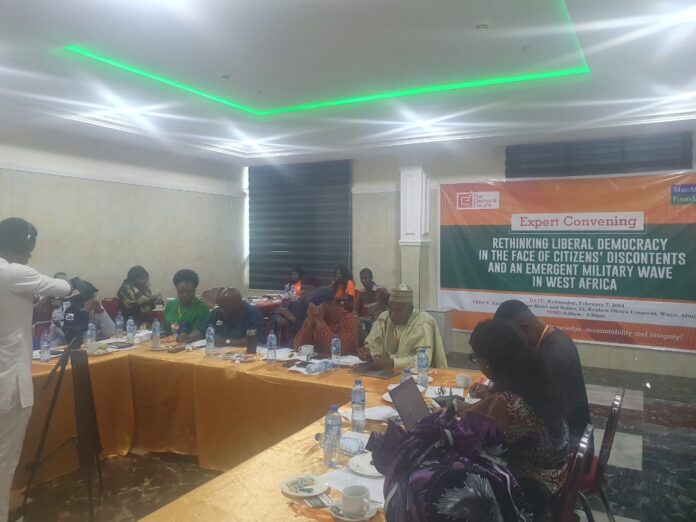Experts across the West African sub-region have called for a paradym shift in the practice of democracy.
By Chimezie Godfrey
Experts across the West African sub-region have called for a paradigm shift in the practice of democracy.
In a bid to proffer solution to the threat to democracy in Nigeria and Africa, Experts, Practitioners, Academics, and Activists, across the West African region converged in Abuja on Wednesday, in a meeting organized by the Electoral Forum in collaboration with the MacArthur Foundation.
Themed, “Rethinking Liberal Democracy in the Face of Citizens’ Discontents and an Emergent Military Wave in West Africa,” the gathering expressed dismay over the recent wave of military incursion that has toppled democratically elected governments in the sub-region.
In his opening remarks, the Chairman, Electoral Forum, Prof Bayo Olukoshi decried the fact that democracy in West Africa and Africa at large has been in crises.
According to him, the current democratic system as practiced in Nigeria and other countries in the West African Sub-region is not working, and therefore stressed the need for a paradigm shift.
He said,”This is a gathering of academics, activists, practitioners and other entrusted parties across the West Africa, designed to open a reflection on the state of democratization in West Africa particularly, against the backdrop of our recent culture that the subregion has experienced most manifestly in the form of military coup de’tat.
“But also more generally in the context of the apparent failure of elected government to deliver of the promise both of genuine democratization and developmental progress for our country and our peoples.
“It is an evidence that our democratic system is simply not working, as the designers may have envisaged and the time to have a rethink has come.”
On the possibility of the Civil Society Organisations getting the political actors who are the beneficiaries of the present corrupt political system to succumb to the desired change, Prof. Olukoshi said,”They are politicians, if the organized power of the people moves in a certain direction, politicians are like chameleon, they will adapt.
“They are not so invested in a dogmatic way to a particular line of doing things. They live to fight another day and at the end of it all, it is for society, civil society to use that notion, to reorganize in a way in which the organized pressure from the people for change can begin to be felt in the system.
“And you know, even in our country with all of the feelings of discontent that has built up, you will find that there have been attempts to try to change the tone and the tenor of politics in our culture.”
Olukoshi urged citizens to shun religious, regional, and ethnic sentiments saying,”the burgeon of religion, of region and of ethnicity must fall off for us to have that united nation and we’ve seen the possible seeds of it.
“Imagine where you had the EndSAS movement, it was not a movement about ethnicity. Even if in the end, there was a concerted effort to disperse it and to fragment it on the grounds of regional and ethnic and other sentiments. But the young people who came together did not come together on the basis of ethnicities”.
Prof Adele Jinadu, an Eminent Political Scientist, and a member of the Electoral Forum, noted that the way forward in advancing democracy in West Africa and particularly in Nigeria is to hold the political class accountable.
Prof. Jinadu noted that they have assembled to reflect on the crisis of democracy in Africa, but specifically focusing on West Africa because of recent events in the African sub region, and what needs to be done to stop the reversal of the democratic gains that have been achieved in the last 15 to 20 years.
“I think one way forward is to hold the political class, particularly the political parties who control the executive and the legislature in the sense that members of the executive team, particularly the President, for example, he’s elected on party platform and members of the legislature are elected on various party platforms, and they therefore have control over this very two vital organs of government.
“Thinking of how do you hold them responsible and accountable? Because it’s an assessment that at the root cause of what we are going through now, is because the political parties have been anti-democratic, and are the major threat to democracy in Africa.
“Well, the answer is not simple. And I think we need to look at it as part of a process, but that process is to keep on raising consciousness among the people and about their responsibilities.
“I think we need to go beyond talking about democracy in terms of rights of the citizens, we should move forward and start talking about democracy in terms of the obligation, the duty of the citizen to the state, and we feel that once you arouse the consciousness of the people, then they’ll be more aware of their responsibility to hold the political class accountable,” he said.
An Activist from Sierra Leone, and a representative of the Campaign for Good Governance, Benadette French, speaking on the negative impact of neo-colonialism on Africa’s democracy said,”I think while I would not want to downplay, the issue of neo-colonialism, and how that has affected Africa and the practice of democracy to the point that there’s this common pan Africanist view that really points to how Europe and the West have underdeveloped Africa. I think, in my view as an activist, I think we have over lamented that conversation.
“And I think Africa has all it takes to liberate itself, to develop itself, to accelerate to provide the much needed political, economic, and social stability, that can enrich the process of governance and democracy in Africa, given the myriad of resources; I mean knowledge, and material resources that we have.”




